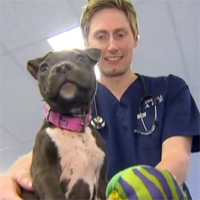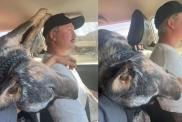Vodka is often called “the hair of the dog,” but for Cloe, an American Staffordshire Terrier puppy from Melbourne, Australia, the Russian spirit proved to be a lifesaving tonic.
Two weeks ago, 9-week-old Cloe started acting very strangely after coming in from outside.
“She was giving us a bit of a scare because she was really disoriented, she couldn’t stand straight, she’d fall over,” owner Stacy Zammit explained to kxan.com.
That night, Cloe’s health seemed to deteriorate even further. The little pup started refusing to eat and crying out as if in pain. That’s when Zammit knew something was really wrong with little dog. She scooped up the ailing pup and hurried to her veterinarian, Dr. Matt Pascall.
After a quick examination of Cloe’s vitals, Dr. Pascall determined that the only possible cause of Cloe’s symptoms was antifreeze poisoning. Cloe likely got into the dangerous chemicals by licking a car part outdoors.
“There’s toxins in [anti-freeze] called ethylene glycol and they’re very, very harmful to the kidneys,” Dr. Pascall explained in an interview with Melbourne’s NBC affiliate, KXAN.
If left untreated for much longer, the antifreeze coursing through Cloe’s body would have proven deadly. The best treatment for antifreeze poisoning, Dr. Pascall explained, is pure alcohol, which, if ingested by Cloe, would neutralize the effects of the poison. But he would have to act quickly if he had any chance of saving Cloe’s life.
That’s when the answer to Cloe’s very serious problem came to him — Dr. Pascall had received a bottle of vodka as a Christmas gift from one of his staff members, and he hadn’t brought it home yet. Though vodka seemed an unconventional cure, the alcohol in the strong drink would mop up the toxins destroying Cloe’s kidneys.
Dr. Pascall put Cloe on a vodka drip immediately, administering the unusual medicine through an IV tube that led from Cloe’s nose and into her stomach.
Over the course of two days at the veterinarian’s office, Cloe consumed more than one third of the bottle of vodka, a dosage that saved the young pup’s life.
“If we put it in human terms, for me it would be the equivalent of having seven or eight shots every four hours,” Dr. Pascall estimated.
Cloe is now back at home, the happy and healthy puppy she was meant to be. But Zammit will never forget how close Cloe came to death, or the strange course of treatment that saved her best friend’s life.
“It’s quite funny, to be honest,” Zammit said of Cloe’s lifesaving vodka treatment. “Flushing her with vodka to make her better.”
If you suspect that your pet has ingested antifreeze or other deadly poisons, follow Stacy Zammit’s example and consult a veterinarian immediately. The ASPCA’s Animal Poison Control Center is also available 24 hours a day to provide assistance to pet owners in the event of a poison-related emergency. They can be reached at 888-426-4435.
Sources: KXAN, Daily Mail









